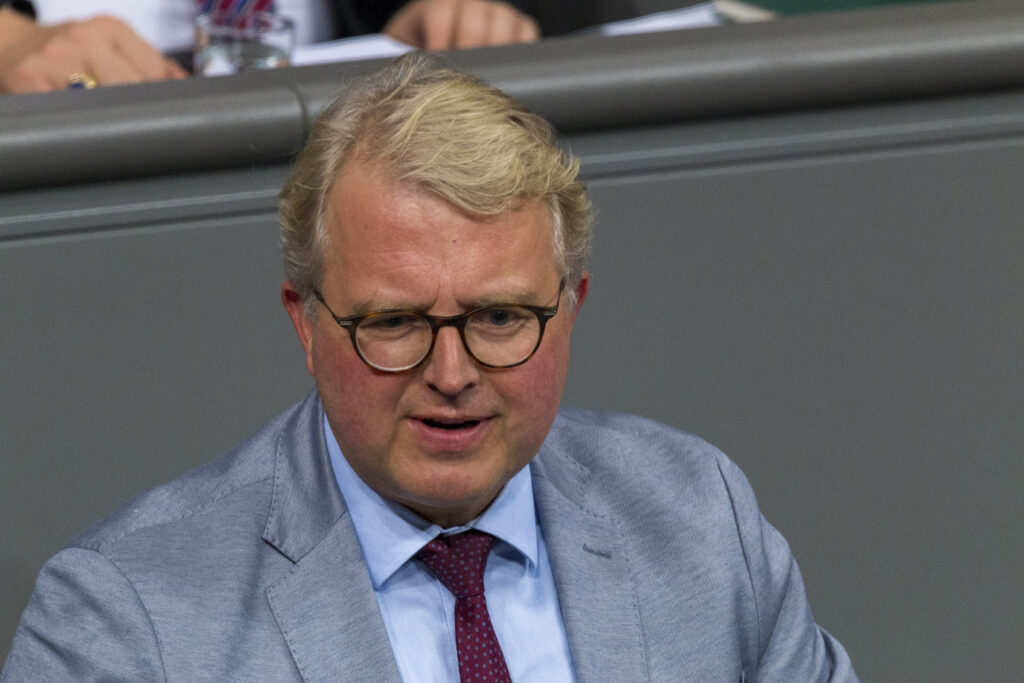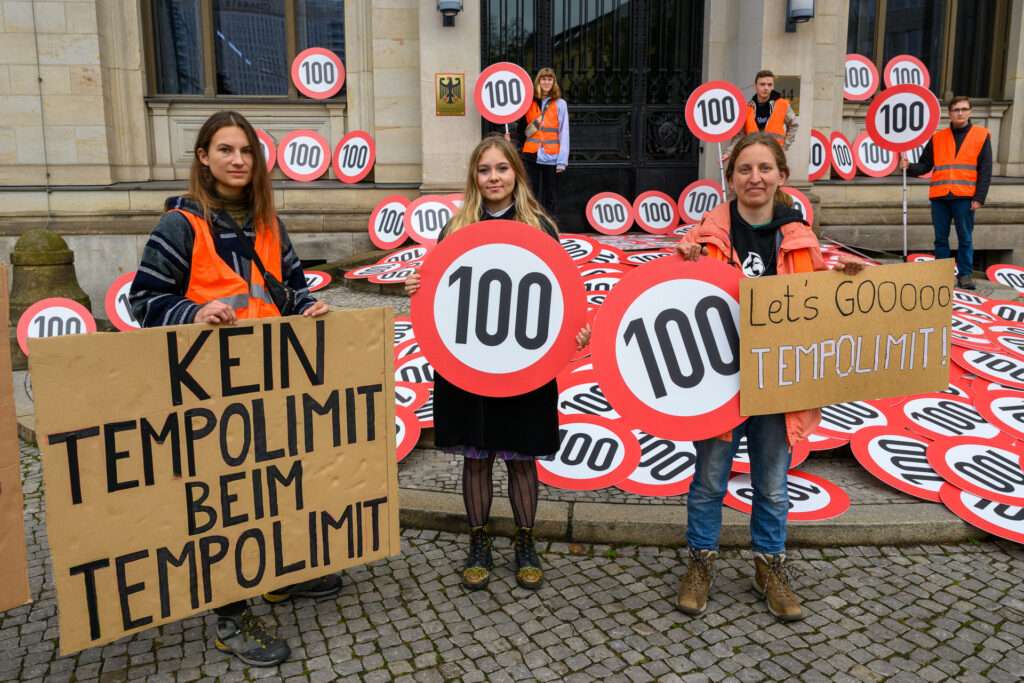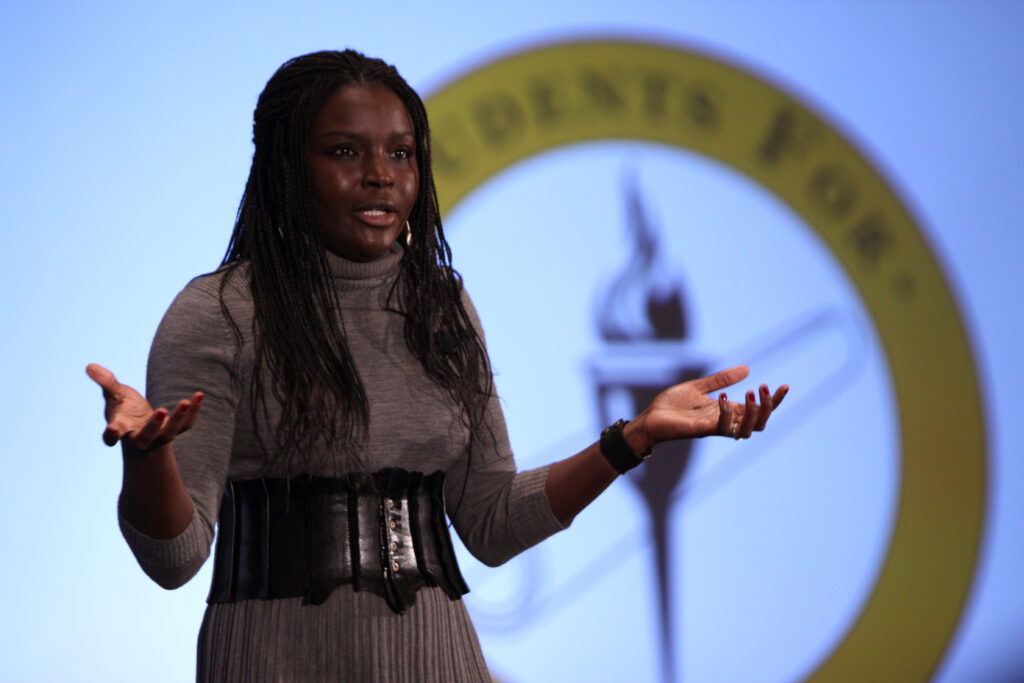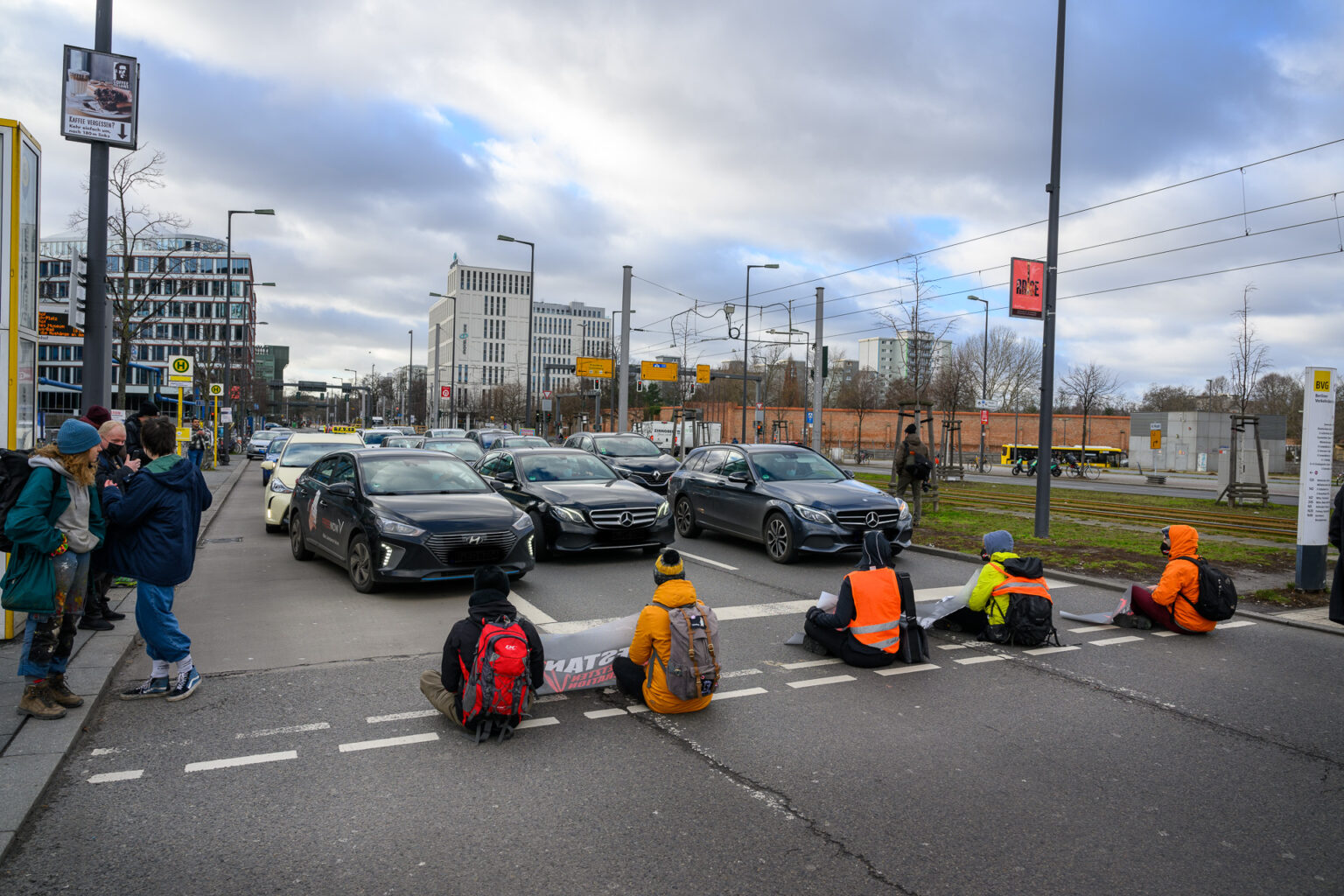By Amy Westervelt, Drilled, and Geoff Dembicki, DeSmog, with additional reporting by Julianna Merullo and Lyndal Rowlands
Earlier this year, news footage began making the rounds on social media of young activists from the German climate organization Letzte Generation (Last Generation) being assaulted by their fellow citizens as they obstructed streets in an effort to draw attention to the German government’s inaction on climate. A young woman, with her hand glued to a road was ripped off the road by her hair; a young man was run over by a truck driver; a passerby punched the protestors and was cheered on. A few months later, German police raided the homes of Last Generation activists and seized their bank accounts. It all seemed like a gross overreaction to a pretty tame form of protest. Although Last Generation stands out for its willingness to inconvenience everyday people’s lives to draw awareness to the severity of the climate crisis, the tactic of road blockades is not a new one — it was commonly used by suffragettes, civil rights activists, and anti-war activists in the pasts, and has been used by cycling advocates for decades as well. During the same year that Last Generation was blocking roads in Germany, farmers used the exact same tactic, blocking roads with their tractors to protest a renewable energy policy that they don’t feel provides enough incentives for biogas. Not a single farmer was punched in the face or dragged off the road by their hair. What was making everyone so irate about Last Generation?
It makes slightly more sense if we go back in time a couple of years and follow how one right-wing politician has been talking about The Last Generation. Frank Schäffler, of the Free Democratic Party, or FDP, is a member of the German parliament, or Bundestag, and is well known for hard-right positions. He came to some prominence several years ago as the leader of a small but loud contingent of German politicians who did not want Germany to bail out other EU countries like Greece during the 2011 debt crisis. More recently he’s been the primary block to a national green building policy that would shift the country away from gas heating in new buildings, using a lot of the same tactics the fossil fuel industry has used to fight against gas bans in the United States: accusing the government of taking away citizens’ freedom of choice, spreading fear that the bill amounts to a “heating ban,” and general anti-regulatory rhetoric. Schäffler has described himself as a “climate skeptic,” and says things like “Climate protection is only possible with [economic] growth.”

Almost as soon as Last Generation began staging protests, in early 2022, Schläffler began describing them as extremists. When they threw mashed potatoes on a Monet in Potsdam, Schäffler took to Twitter to describe the act as “terrorism.” He made a similar statement just a few weeks later, comparing Last Generation to the Red Army Faction (RAF), also known as the Baader-Meinhoff Gang—a leftist group categorized as terrorists by the West German government in the 1970s after they committed multiple kidnappings, bank robberies, bombings, and assassinations, killing more than 30 people. Last Generation, by contrast, are unarmed activists who have committed no acts of violence. Yet Schläffler has continued to call Last Generation terrorists in one way or another; Schläffler also began describing the group as a “criminal organization,” and publicly calling for it to be investigated for organized crime. It’s a lot easier to justify ripping an activist off the road by their hair, or punching them in the face, when a prominent politician is comparing them to violent terrorists, and a major media outlet is repeating that frame, as both conservative publisher Welt and the more mainstream Der Spiegel have done with Schläffler.
Just six months later, in May 2023, German police conducted nationwide raids on Last Generation activists. Police said the raids were the result of an investigation into Last Generation activists for forming “a criminal organization that was fundraising for the purpose of committing further criminal action.” It was almost exactly the response to Last Generation that Schäffler had recommended.

It’s hard to believe that a relatively young politician known primarily for a crusade against Greece that no one really took seriously has had such an outsized role in blocking climate policy and locking up climate activists. And of course, Schäffler is not acting alone. But something important happened between his debt and climate crusades that helps to explain his sudden influence: Schäffler started a think tank — The Prometheus Institute — and he plugged that think tank into a little-known but enormously powerful network called the Atlas Network.
Atlas is a global network of more than 500 member think tanks, advocating for “free market” policies in the majority of democratic countries. Its members are in regular contact with each other, sharing ideas, tips, and strategies. Back in the 1990s, the Atlas Network even bragged about being early adopters of the internet, for the sole purpose of staying regularly connected and sharing ideas. Representatives from member think tanks also meet at events like the annual regional Liberty Forums or the two-day Liberty Forum and Freedom Dinner. Ideas are shared between member think tanks via various publications as well, including the quarterly Freedom’s Champion magazine, a Latin America podcast “Hablemos Libertad,” and various books in both English and Spanish (even a cookbook!).
What’s happened in Germany — public rhetoric vilifying activists, which the media then picks up and amplifies and, ultimately, the criminalization of those activists — is a pattern we’ve seen play out in multiple countries. New research from Drilled and DeSmog reveals that strategy is spreading easily across borders thanks in no small part to the Atlas Network.
The Long Shadow of Thatcherism
To understand the role Atlas Network think tanks are playing today to help frame climate activists as the biggest threat facing society, it helps to understand the network’s history, its long-standing relationship to extractive industry, and its ideological foundation. The Atlas Network describes itself as “a nonprofit that aims to secure the right to economic and personal freedom for all individuals through its global network of think tanks.” But before it was a network it was just one think tank: the Institute of Economic Affairs, or IEA, in the UK, founded by a man named Antony Fisher.
Fisher was born into a wealthy mining family. He went to elite schools — first Eton, then Cambridge — then enlisted in the Royal Air Force during World War II. Legend has it that the experience of watching his brother plummet to his death after his plane was shot down was the impetus for Fisher to fight for a freer and more prosperous world, the idea being that if everyone was better off there would be no need for war. It was a noble idea. In practice, Fisher’s take on freedom was unorthodox, starting with the fact that the primary way he made his own fortune, separate from the family mining money, was by bringing caged chicken farming to the U.K.
Shocked that the British public elected the Labor Party in their first post-war election, Fisher decided he must make sure people voted the right way next time around. He read the Reader’s Digest version of the book Road to Serfdom, by the Austrian economist Friedrich Hayek, which blamed socialism for all of society’s ills, and went to visit Hayek, who was teaching at the time at the London School of Economics. “And Hayek tells him all we need to do is change what the intellectuals think—the teachers, the journalists, these are the people who paved the way for public acceptance of the welfare state, so these are the people we need to target,” says Jeremy Walker, a senior lecturer at the University of Technology Sydney, longtime Atlas Network researcher, and author of the book More Heat Than Life: The Tangled Roots of Ecology, Energy and Economics. Hayek told Fisher to forget about getting into politics and to engage instead in a “war of ideas.”
In 1954, Hayek invited Fisher to join the Mont Pelerin Society, a global group of academics, writers, and thought leaders who met to discuss, debate, and promote neoliberal ideas. The next year, Fisher started the IEA. For the first few years, it didn’t have much success, but then in the early 1960s Fisher landed the think tank’s first big corporate donor: Royal Dutch Shell. Shortly after Shell started to back Fisher, BP came onboard as well, and suddenly the IEA started to have some real impact.
“They would get these professors to write short, digestible articles, often around things like currency conversion or sort of things that were fairly technical to the non-economists,” says Walker. “But then they would have these wealthy donors to the IEA who would buy copies and send them to all the schools and the universities.”
Not disclosing their corporate donors was a key to IEA’s success, too.
“The think tank method allowed corporations to say things that they couldn’t say themselves without appearing to be merely speaking to their own profit motives,” Walker said.
In this way the IEA was able to rapidly spread the sort of free-market ideology that helped elect Margaret Thatcher, and spread her particular form of conservatism.
Meanwhile Fisher took his caged-chicken fortune and used it to start a turtle farming (yes, turtle farming) venture in the Cayman Islands. As the IEA puts it in their history of Fisher, “The turtle farm was poised to be a real winner but the environmentalists persuaded politicians to ban its products.”
Suddenly Fisher had a lot of time on his hands and a lot of people wanted to know how the IEA had managed to push UK politics so far to the right and so quickly. So, he took the show on the road. In 1970, he did a speaking tour in the United States with the Institute for Humane Studies — an organization funded by Charles and David Koch, early on in what would be a decades-long career in massively reshaping American politics for industry’s benefit. In those U.S. talks, Fisher encouraged American businessmen to fight back against the social movements of the 1960s. In 1974, Fisher traveled to Canada, co-founding his first think tank outside of Britain: the Fraser Institute. The same year, the IEA loaned one of its leaders, Nigel Vinson, to rising conservative politician Margaret Thatcher to start a sister think tank, the Centre for Policy Studies in the U.K. Then Fisher was on the road again to Australia, where Rupert Murdoch helped him found the Centre for Independent Studies in 1976. Back in the UK, Fisher co-founded the Adam Smith Institute, another IEA copycat, in 1977. In 1978 he returned to the United States, where he co-founded The Manhattan Institute, and The Pacific Research Institute in 1979, again with help from the Koch Brothers and the extractive industry. By this point, his work with the IEA and the Centre for Policy Studies had succeeded in getting Margaret Thatcher elected. Famed “free market” economist Milton Friedman would later say that “the U-turn in British policy executed by Margaret Thatcher owes more to Fisher than any other individual.”
In 1979, Fisher had the idea of connecting all of these IEA clone organizations he’d started into a network so that they could more easily work with each other and cross-pollinate ideas. He asked Hayek for introductions to his “friends in Houston” — oil executives — for funding. The Atlas Network, which launched in 1981, initially only included the first dozen or so think tanks Fisher had helped to found himself, but quickly expanded to include hundreds of like-minded member organizations, including all of the Koch-affiliated think tanks in the United States (the Cato Institute, the Heartland Institute, the Heritage Foundation, and the American Legislative Exchange Council — some of the most influential forces shaping U.S. conservative politics — are all members).
With access to powerful people came funding from powerful sources. A review of Atlas’s publicly available financials, data from the Conservative Transparency database, and 990 tax forms filed by various foundations reveals that Atlas has received millions of dollars in funding from a number of Koch-funded foundations, the ExxonMobil Foundation, and the Sarah Scaife Foundation, which has a long history of funding climate denial, since its founding. As with the Fraser Institute in Canada, the various Koch-backed think tanks in the United States, and the Centre for Independent Studies in Australia, many of the individual member think tanks that form the Atlas Network are separately funded by foundations affiliated with extractive industries — and, in some cases, supported by donations directly from industry — as well.
At first, Atlas included only the initial dozen or so think tanks Fisher had helped to found himself, but it quickly expanded to include hundreds of like-minded member organizations, including all of the Koch-affiliated think tanks (the Cato Institute, the Heartland Institute, the Heritage Foundation, and the American Legislative Exchange Council are all members). Fisher focused in the early years of the Atlas Network on expanding internationally, particularly in Latin America where oil executives around the world were very concerned about leftist movements. One of the first investments Atlas made was in Venezuela, where it funded the launch of the Center for the Dissemination of Economic Information (CEDICE) in 1984. Decades later, CEDICE was instrumental in ousting Hugo Chavez. Similarly, Atlas set up shop in Brazil in the 1980s, working with various agribusiness groups to push back against the environmental regulations and Indigenous rights proposals being proposed by the Workers Party. Atlas helped to spur the “Free Brazil” movement that ultimately propelled Jair Bolsonaro to the presidency. More recently, at the Atlas Network’s annual regional event, Liberty Forum Latin America, agribusiness influencers and think tank heads spoke about finding a path back to power and stopping the current president, Luiz “Lula” Da Silva, from what they described as a “land invasion”: his campaign promise to protect Indigenous land rights from agribusiness and to transfer private farmland to worker ownership.
In a 1982 memo, Fisher also outlined plans for think tanks in Argentina, India, South Africa, and Sri Lanka, noting in each place a local businessman or politician that wanted to start an institute. He went on to co-found all of them, and all are still operating today.
Alejandro Chafuen, an Argentinean-American businessman who took over the Atlas Network presidency in 1991 and remained in charge until 2018, once described the Atlas Network’s audience in one word: elites.
“To answer the question ‘Who is the real customer of a think tank?’” he said, ”I will refer to the often ignored passage of Ludwig Von Mises, in his book Bureaucracy. In it he describes a type of person – elite – who I believe is not only the real customer of Atlas and many think tanks, but also our ideal customer, who benefits us and is served by us.”
Activists as Terrorists
From Fisher in the 1970s to Frank Schäffler in 2022, Atlas Network executives and member think tanks have always painted environmentalists and the regulations they seek to place on polluting industries as a cancerous growth on society. According to Chafuen’s online biography of the Atlas Network, The Pacific Research Institute was started in California in 1979 specifically to focus on environmental issues. “Fisher and Jim North were ready to launch a research center that would have an important focus on environmental topics,” he writes. “They recruited David Theroux who had an outstanding career developing academic programs in the early years of Cato.” Chafuen goes on to describe the dinner parties that Fisher and early PRI staff would have with Fisher’s neighbor and friend, famed “free market” economist, Milton Friedman.
A 1991 report from Atlas member The Mackinac Institute calls early environmentalists like David Brower and EarthFirst activists “reactionaries” who are “anti-human.” In 1994, when it released its first Environmental Indicators report, Pacific Research Institute said the purpose of the report was to show that “contrary to environmentalists’ apocalyptic gloom, the improvement in the environment is perhaps the single greatest public policy success story of the last generation.”
When Chafuen left his position as Atlas Network president in 2018, he went on to run one of the most prominent Atlas Network member think tanks, the Acton Institute, which has long pushed a Christian-flavored brand of climate denial. Acton also incubated the Cornwall Alliance, another association of think tanks and faith-based groups with close links to another Atlas member, the Heritage Foundation. In a 12-part DVD series called “Resisting the Green Dragon,” released in 2010, the Cornwall Alliance described environmentalism as “spiritual deception,” and warned of “dangerous environmental extremism.”
This kind of rhetoric is exactly what we see today in countries moving swiftly to criminalize environmental and climate protest. While of course industries and governments around the world had plenty of their own reasons for categorizing environmentalists and animal rights activists as extremists and terrorists, Atlas Network think tanks have capitalized on that framing for decades. In recent years, they’ve packaged it in ways that could be turned into anti-protest legislation.
Schäffler in Germany is only the most recent example. In Guatemala, Fundación para el Desarrollo de Guatemala (FUNDESA) has spent many years decrying the impact that environmentalists and Indigenous rights activists have on “investment” in the country. In response to massive protests against the RENACE and OXEC dams in 2015 and 2016, FUNDESA director Salvador Paiz wrote various pieces about extremist environmentalists, describing environmentalists across Latin America as a “terrorist network”and calling out the leader of the dam protests, Bernardo Caal Xol, in particular as an outside agitator. Xol was sentenced to seven years in prison for his role organizing protests against the dams.
U.K.-based Atlas member think tank Policy Exchange put out a report in 2019 called “Extremist Rebellion,” describing Extinction Rebellion, an organization famous for shutting down parts of London to call for aggressive climate action, as “an extremist organization seeking the breakdown of liberal democracy and the rule of law.” As in Germany, several politicians and conservative media outlets repeated that framing as well (one columnist even echoed Schläffler’s complaint, comparing Just Stop Oil to the Baader-Meinhoff gang) and it wasn’t long before people began cold-cocking Extinction Rebellion and Just Stop Oil activists as they blocked roads or staging other forms of non-violent, disruptive protest.
Four years later, during a speech at Policy Exchange’s annual summer garden party in 2023, UK Prime Minister Rishi Sunak thanked the think tank’s members for “helping us draft” the UK Police, Crime, Sentencing and Courts Act of 2022, according to Politico. The legislation criminalized protest within a newly created ‘buffer zone’ around Parliament, gave police the power to impose noise-based restrictions on protest and to impose restrictions on public assemblies, criminalized one-person protests, criminalized trespass (which affects not only protestors but also the UK’s large Gypsy and Traveller communities), and created the criminal offense of “willful obstruction of the highway,” to curb protests that block roads. In the wake of the law’s passage and several arrests and court cases, Extinction Rebellion announced it would no longer engage in disruptive protest.
This pattern also took place in Canada as a reaction to the Idle No More protests in 2012, a national protest movement led by First Nations activists calling for greater recognition of rights and sovereignty for Indigenous peoples and rejecting tar sands expansion on their traditional territories, and in the United States in the wake of the 2016 and 2017 protests of the Dakota Access Pipeline at the Standing Rock Indian Reservation. A series of papers put out by Atlas member think tank the MacDonald Laurier Institute in 2013 and 2014 paint First Nations activists as potentially violent, cautioning of the havoc these “warrior societies” could wreak on Canada. During a 2017 meeting of the American Legislative Exchange Council (ALEC), which is an Atlas member that connects conservative politicians and corporations, Derrick Morgan, then the VP of Public Affairs for the American Fuel and Petrochemical Manufacturers, described protestors at Standing Rock as “dangerous and destructive.” He claimed that a large number of the activists at Standing Rock had criminal records, and warned that these sorts of protests were becoming more violent.
By the end of 2017, AFPM had drafted legislation criminalizing protest near “critical infrastructure,” the state of Oklahoma had passed it, and ALEC was pushing it to other state lawmakers. Canada took a similar approach, with various provinces passing anti-protest legislation, and the Royal Canadian Mounted Police forming a new police unit — the Community Industry Response Group — to shut down protest camps and arrest protestors.
“The Macdonald-Laurier Institute is an independent and non-partisan think tank,” a spokesperson wrote in response to detailed questions from Drilled. (Neither the Atlas Network nor any of the other member think tanks mentioned in this piece replied to requests for comment.)
“Redwashing”
But MacDonald Laurier also recommended a parallel strategy, urging companies and governments to make First Nations “equity partners” in natural resources projects on their territories, in the hopes that a higher share of revenues would convince some First Nations groups to become vocal supporters of oil and gas projects, a tactic known as “redwashing.”
Now, pipeline companies in Canada loudly declare their support of Indigenous sovereignty while First Nations that protest fossil fuel expansion are arrested by militarized police. Similarly, in Australia, the Centre for Independent Studies — an Atlas member that was founded with grants from Rupert Murdoch, Shell, BHP, and Rio Tinto — has placed various op-eds trying to stoke fear of “Aboriginal Terrorism” related to land defenders and Indigenous land rights more broadly. At the same time CIS has sought out and hired Aboriginal spokespeople that can argue in favor of controversial projects like the Beetaloo Basin fracking project (that old Murdoch connection helps get their stuff onto Sky News all the time, too). The CIS has a whole project geared towards saying that any rights given to Indigenous people are actually welfare that is harming them (this is a longtime talking point amongst Atlas think tanks in the United States as well, especially the Heritage Foundation, the Cato Institute, and Heartland).
Peru’s Instituto Libertad y Democracia, another early Atlas Network member in Latin America, puts its own free market, private property spin on this with a theory pioneered by the think tank’s president, economist Hernando de Soto. De Soto came up with his theory in the wake of a bloody 2009 standoff between police and Indigenous activists, protesting oil and gas drilling in the Amazon as well as other infringements on their land rights. Outlining an approach he eventually branded as the “Avatar Myths Strategy” De Soto argues that Indigenous people aren’t being exploited like in the movie Avatar, that actually the solution is to bring them into the “rule of law” via property rights. Private property will enable Indigenous people to realize value from their land and resources, De Soto argues, which will make them less likely to protest extraction from that land because they will also benefit from it. On its website, the ILD argues that this strategy will help Indigenous people “work within the market and defend their interests — without losing their customs or identity.”
Magatte Wade, head of an internal Atlas project focused on Africa, called the Center for African Prosperity, frequently cites De Soto as an inspiration for her take on Africa and climate change. In multiple op-eds over the past few years, and an interview with Canadian professor Jordan Peterson, Wade, who was born in Senegal but moved to Germany when she was seven, and has lived for several years in Texas, describes climate activists as the new colonialists, arguing that climate action will keep Africans poor and deprive them of access to energy. Wade often depicts those who would deny the continent its current fossil fuel boom as out-of-touch elitists. She likes to tag her thoughts on this subject #BlackLivesMatter, arguing that climate action — which she distills to “turning off all the fossil fuels immediately” — will kill a billion Africans, all while refusing to engage with the fact that African climate activists are being arrested at an alarming rate.

Wade promotes free market capitalism as the only way out of poverty for Africa, and parrots decades worth of Atlas talking points about the dangers of regulation on business. As the head of the Center for African Prosperity, she brings leaders from other Africa-based Atlas think tanks together to further amplify these talking points on webinars and in their own op-eds. These arguments, of course, fly in the face of what economists have been saying for at least the past decade about the impact fossil fuel development has on developing economies and how to address energy access without exacerbating the climate impacts that are also felt first and worst by Global South communities. “Eradicating persistent poverty and mitigating climate are both extremely important, pressing priorities for the Global South,” says Narasimha Rao, Ph.D., who leads the Decent Living Energy project at Yale. “And it’s well understood that climate change is a threat multiplier for people. It exacerbates poverty.”
The key, according to Rao and a growing number of economists, is to find ways to eradicate poverty without significantly increasing emissions — which could include fossil fuels (gas in particular) in the short term, but shouldn’t lock them in. As for oil majors undertaking massive new projects in Africa? They’re certainly good for oil company profits, but “it’s questionable to what extent those are going to eradicate poverty,” Rao says. It’s questionable whether they’ll address energy access either. Nigeria, for example, which has been partnering with oil majors for longer than most countries on the continent, has the lowest energy access rate in the world, with nearly one in two people lacking access to power.
Those Damn Kids
The youth climate movement that kicked off with school strikes in the wake of the 2018 report from the Intergovernmental Panel on Climate Change, warning that governments had about 12 years to implement aggressive decarbonization policies if they wanted to avoid the worst impacts of climate change, sparked a whole new wave of anti-climate-protest campaigns from Atlas Network think tanks. Internal BP marketing documents leaked to Drilled in 2020 revealed just how caught off guard the industry was by the youth climate movement. The biggest threat? The movement’s authenticity. And so, an army of think tanks, many of them funded by the industry, turned to the media, social media, and any other platform they could access to mock, criticize, or fearmonger about the activists.
In Sweden, where Greta Thunberg founded Fridays for Future, a youth climate group that went on strike each Friday to demand climate action, the Atlas think tank Timbro and its research arm Ratio began branding climate activists as “climate populists,” comparing youth climate activists to Nazis, and warning that their doom and alarmism will make them likely to turn to extreme tactics.
U.S.-based Atlas think tanks mobilized against youth climate protestors almost immediately as well, with the Cato Institute, Heartland Institute, Heritage Foundation, Acton Institute, Competitive Enetrprise Institute, and American Enterprise Institute all putting out various anti-Greta screeds in 2019. And the vilification of youth climate activists has continued since then, particularly of Thunberg, who U.S. Atlas members have accused of everything from simply not understanding how the economy works to being part of a media conspiracy, conspiring against India’s tea to intentionally spreading climate doom for various nefarious purposes (just recently Cato suggested it was to provide an on-ramp to authoritarianism.) In 2020, the Heartland Institute, an Atlas member that is funded primarily by the various Koch Industries-related foundations, even went so far as to secretly hire a German YouTuber Naomi Seibt, and push her as an “anti-Greta.”
In Australia, Atlas members took to the media en masse to protest the young protesters. The Australian Taxpayers Alliance — which usually sticks to, unsurprisingly, issues around taxes — got a young intern to go on Sky News and sneer about how climate strikers should stay in school. The Centre for Independent Studies worried in a blog post that literacy was taking a backseat to activism in Australian schools. The Institute for Progress suggested teachers take the opportunity to inform the students who weren’t striking that “our world would collapse without fossil fuels.”
Yet another Atlas think tank, the Institute of Public Affairs, regularly sends its researchers on Australian Sky News to talk about how climate extremism is ruining the country’s children. “Everything from the minute they get up in the morning to the minute they go to bed is all about worrying about the fact that we’re going to have an apocalypse,” IPA researcher Bella D’Abrera said in one segment. In another, she mockingly called Greta Thunberg a “saint” before going on to describe climate activism as child abuse. “Very surprising that Saint Greta is appearing on the front of the legal studies textbook,” she said. “…you know, the climate change marches, the, sort of the terror there. That they’re filling children with, which is, um, which is akin to sort of child abuse.”
Multiple high-level Australian politicians also have various ties to Atlas Network think tanks, both in Australia and throughout the world. In 2020, at the height of the Australian bushfires, former prime minister Tony Abbott, made an appearance at the Heritage Foundation to complain about climate activists. “If you think climate change is the most important thing, everything can be turned to proof,” he said. “I think that to many, it has almost a religious aspect to it.”
In 2019, as a response to protests against the expansion of coal in Australia, the Queensland government passed the first anti-protest law in the country explicitly citing environmental protestors as the target, the “Dangerous Attachment Devices” law. It described the various types of chains, glue, and locks activists had been using to attach themselves to mining equipment, roads and bridges as dangerous to both first responders and the activists themselves, although the government never provided any evidence that was actually the case. In its public comment in support of the law the Queensland Resources Council, a local industry group, argued that the law — which not only establishes fines and jail time for activists caught with these devices, but also enables police to stop and search anyone suspected of carrying one of these devices without a warrant — didn’t go far enough. They suggested adding a penalty long suggested by another Atlas think tank, the Institute for Progress: stripping the charity status of any organization involved in the protests.
In the three years since that first law was passed, nearly all of the country’s states have passed legislation criminalizing protest.
Winning the Rhetorical War
The neat trick of Atlas members’ rhetorical warfare against environmentalists for so many years is that it’s not just about preaching to the choir. On the contrary, it has convinced even those who agree with the protestors that they are being too “radical,” too disruptive.
The media has mostly gone along with this framing as well. According to a new study from Media Matters, MSNBC was the only major news network in the United States to mention the criminalization of climate protests, airing a single segment since the trend began in the wake of the Standing Rock protests in 2017. When they do cover climate protest, mainstream outlets have tended toward stories that discuss whether or not it’s “appropriate” to throw tomato soup at the display case of a famous painting or glue oneself to a road, and whether these tactics endear climate activists to the public or not, than on what the protestors are actually trying to accomplish. Media Matters’ analysis found that less than half of U.S. media stories on climate protest included anything about the scientific basis for climate change or the political stalemate driving the surge in protests. Meanwhile, the study found that Fox News has run four times the combined coverage of its competitors CNN (27 segments) and MSNBC (9 segments), and all of the network’s 144 segments on the topic have painted climate protestors as dangerous radicals. “The lack of coverage from mainstream outlets has created a vacuum that Fox News has rushed to fill with biased coverage that vilifies the climate activists,” Evlondo Cooper, the study’s author, said.
Social scientists who study movements and social change have largely been confused by how much questions over the “civility” of climate protestors’ tactics have dominated the discourse around climate protest. “There really hasn’t been much destruction of property, the climate movement’s tactics have been very tame so far,” says Dana Fisher, who heads up the Center for Environment, Community, & Equity, and has been researching protest in general and climate protest in particular for years.
The fixation on whether or not climate activists are “radical” makes a lot more sense in the context of the Atlas Network’s history. “It’s this method that you see over and over again over the years,” Walker, the Atlas researcher, says. “They’ll throw something out into the public sphere, which will get a little bit of press, and then before you know it, a new law has been written, possibly by one of them. And now you have the criminalization of what was previously seen as legitimate civil protest.”
This article was co-reported with Drilled, and co-published by The New Republic.
Subscribe to our newsletter
Stay up to date with DeSmog news and alerts







